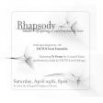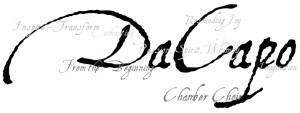
Spring was in the air. As is often the case with the season of renewal, it was mixed with celebration and love.
On Saturday night, at St. John the Evangelist Church in Kitchener, the DaCapo Chamber Choir directed by Leonard Enns closed out their eighth season with a seasonally inspired concert titled Rhapsody, music of spring, celebration and love.
To amplify the finale of the celebration — and also the themes of spring and love — DaCapo hosted the acclaimed Tactus vocal ensemble.
Tapestry, a short courtly-sounding work by hammered dulcimerist Paul Haslem, opened the concert. Haslem, who’s been described as a national treasure, also accompanied DaCapo for Reel a’ Bouche, a work by the American composer Malcolm Dalglish that called upon the choir to sing in improvised syllables to imitate the effect of folk instruments.
We Welcome Summer, by New Zealand composer Clare Maclean, is based on an odd spiritual text by Australian newspaper cartoonist Michael Leunig. This highly textured work paints a sonic picture of summer light.
Antonin Dvorak’s In Nature consists of five short movements set to the nature-inspired poetry of Vitezslav Halek. There was a natural and seamless sense of rubato in the performance. DaCapo’s flowing musicality gave each movement a strong sense of character and a unique identity.
The eight tightly knit voices of Tactus Vocal Ensemble closed out the first half with a musically varied set of short choral works, including Languisco e moro by the harmonically progressive Renaissance composer Carlo Gesualdo, Mille regrets by the Franco-Flemish composer Josquin des Prez and Chanter je veux, by Robert Evans.
Western Wind by Leonard Enns, a short, dark and richly textured composition, was preceded by a moving solo voice performance of the traditional setting of the anonymously attributed text.
Tactus’ performance of Thule, the period of cosmography by Thomas Weelkles (c. 1575-1638) charmed the audience. An aural explanation of a few of the odder words in the text (Hecla, Trinacrian Aetna, Andalusian, Fogo Burns) helped decipher the cosmographical references. Spring has come again, an angular-sounding work by local composer Barrie Cabena rounded out Tactus’ solo set.
Amor de mi Alma by the American composer Z. Randall Stroope and the spiritually orthodox-sounding Canticum canticorum by the British composer Ivan Moody commenced Da Capo’s second half.
For the finale, Leonard Enns’ Te Deum (1988), both choirs joined forces, resulting in a striking and awesome forte effect in a dynamically varied and nuanced performance. The climax of Te Deum was surprising and pleasantly disorienting, like a great ending should be.




